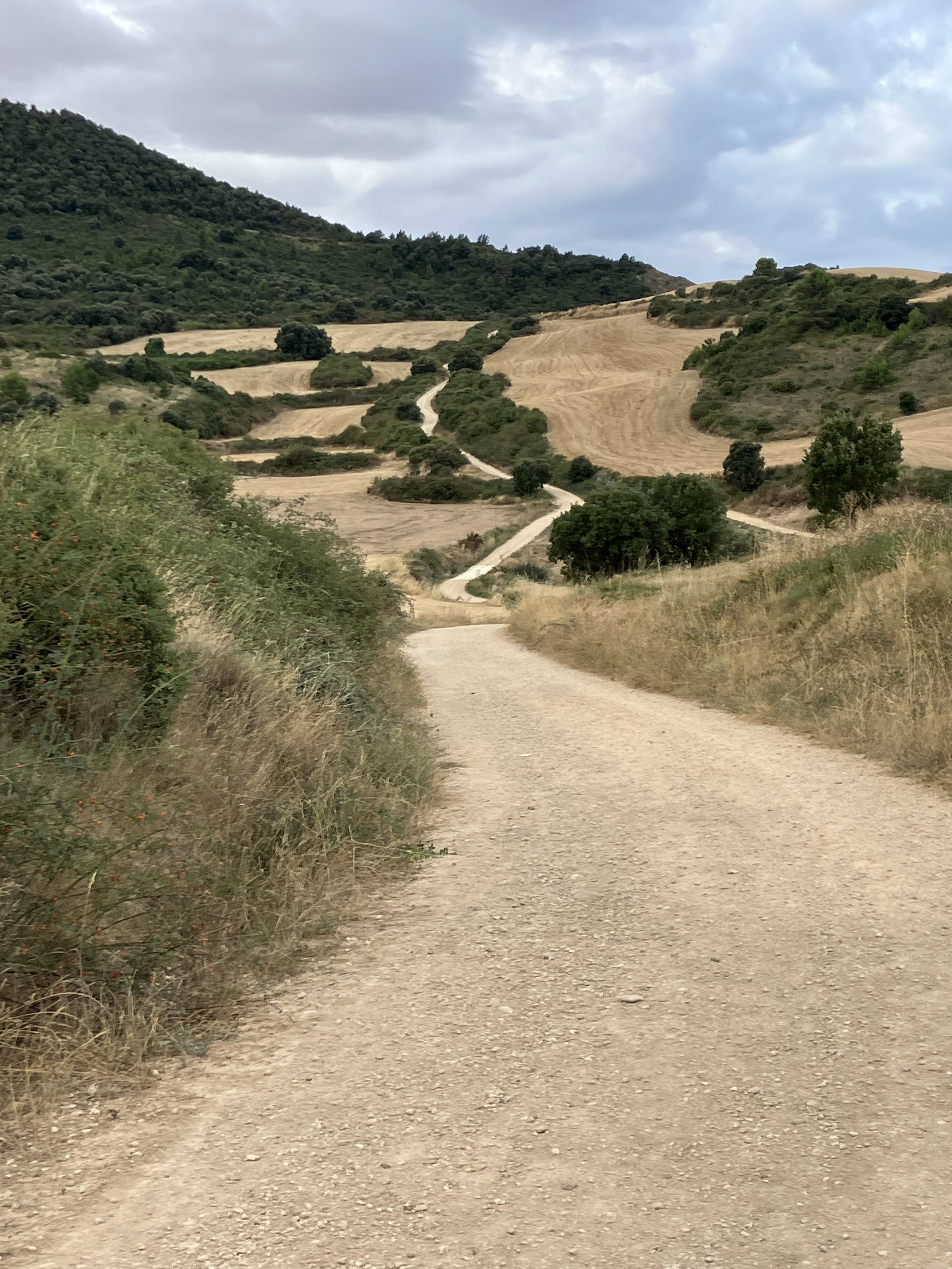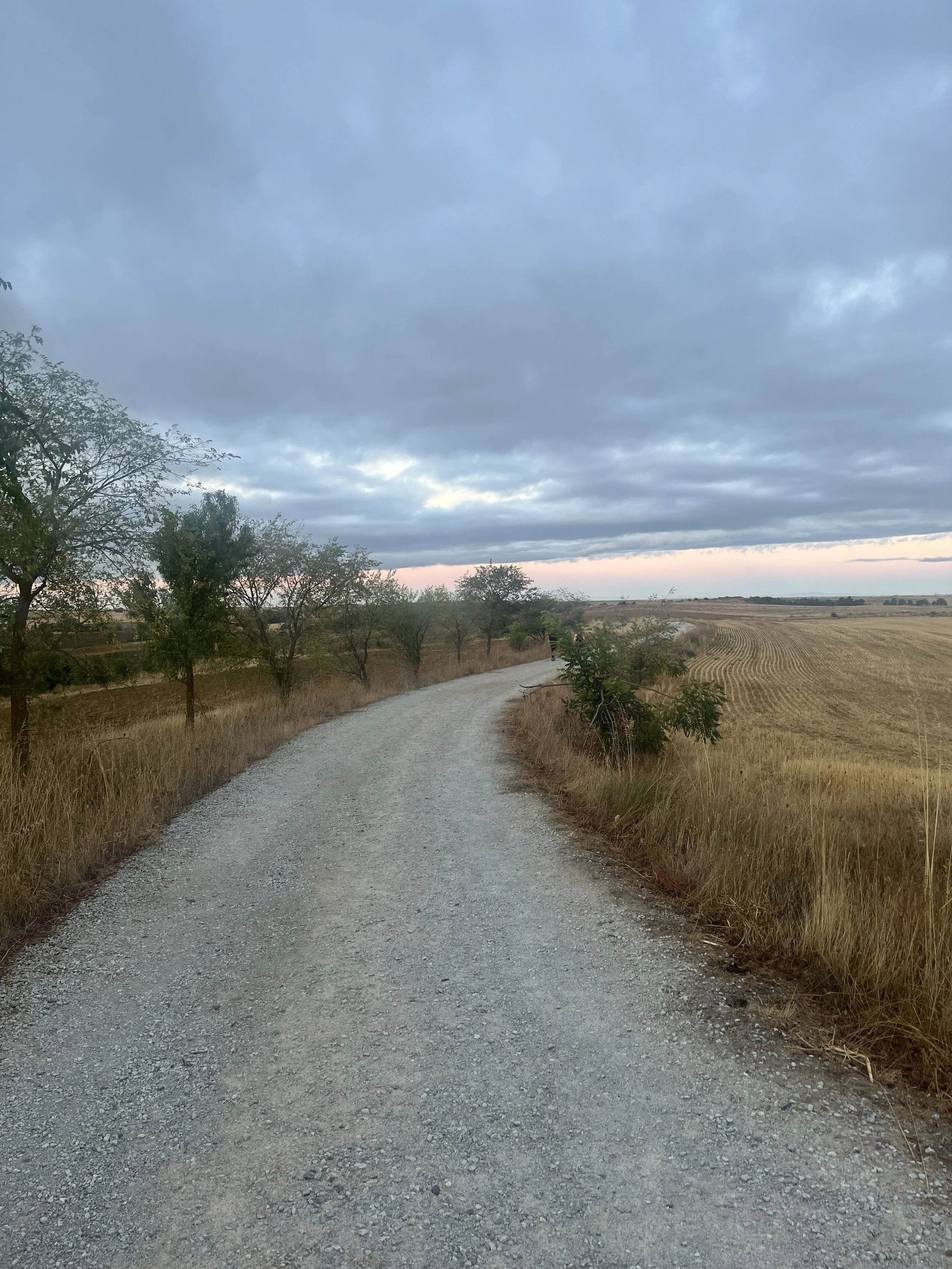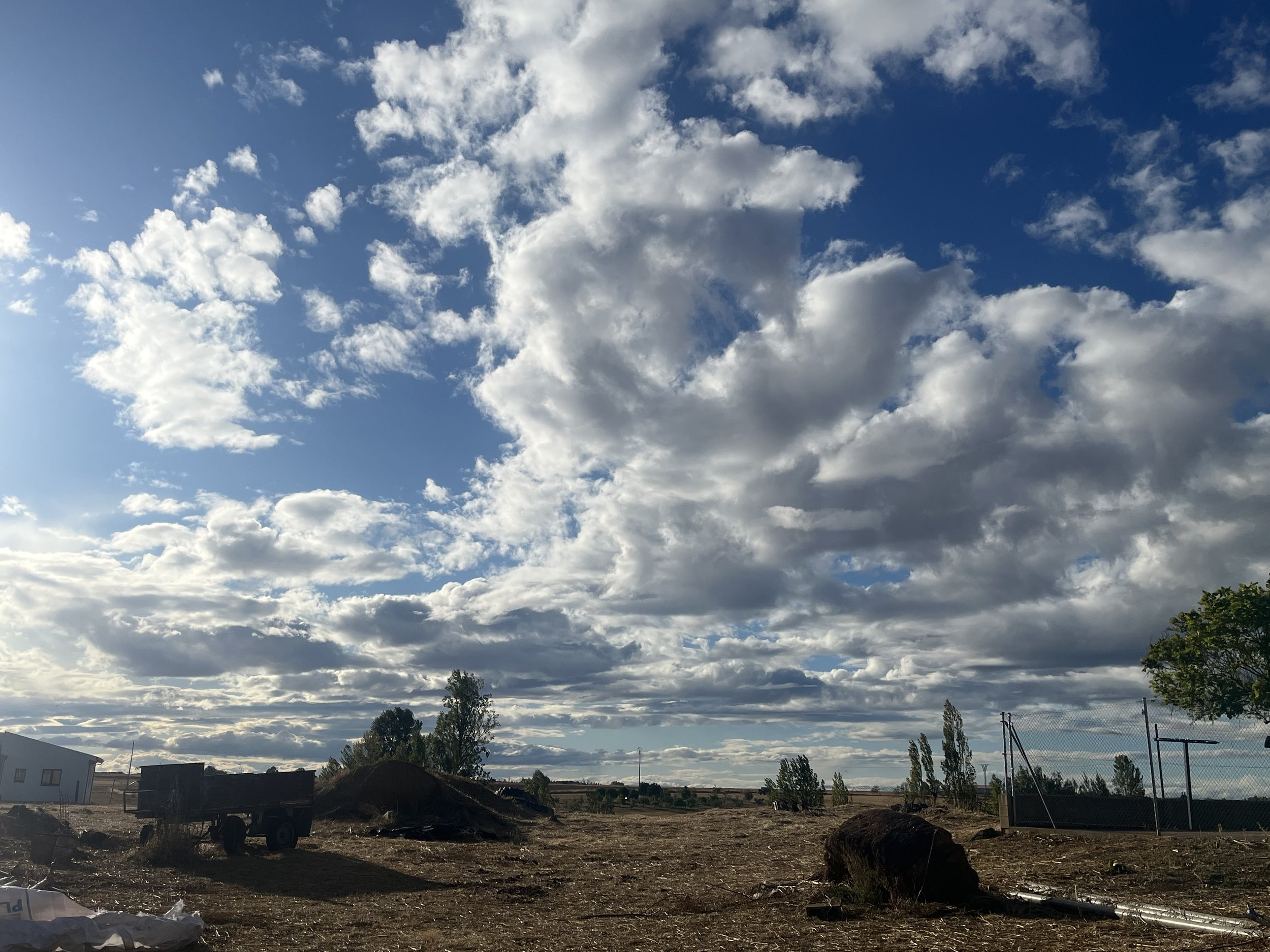Rose Chooses to Voluntarily Stop Eating and Drinking (VSED)*
Stethoscope around her neck, nursing bag in hand, Debra knocked on the door. Rose's son Daniel let her in. Boxes, coats, and mail cluttered the front entry. Daniel led Debra to the hospital bed in the dining room, whispering to her, “She’s the same — exhausted, out of breath, irritable.” He then yelled towards his mother, "It's hospice!"
Rose struggled to sit upright in her hospital bed, wearing a pink house dress with billowy blue gray flowers the color of her eyes. Her short white hair was freshly brushed and standing up in all directions. Rose then motioned Debra to sit in the chair inches from her bed and Daniel went back to washing dishes in the sink while keeping a nervous eye on his mother. Oxygen tubing ran from Rose's nose to the floor, encircling Debra's chair, and coiling around the dining room set.
“I'm going to get straight to it, Debra,” Rose said, leaning forward gripping the side rails. Her shortness of breath forced her to pause after every four or five words. “How much longer do I have to live?” There was a desperate look in her eyes.
Debra had worked with Rose for months and knew she was tired of dying. During her last visit, Rose cursed when she needed both Dan and Debra to get her off the toilet seat.
After Debra did some calculations in her head, (months of incremental slow decline, stable weight, labored breathing relatively under control), she said, “Well, it’s hard to predict with COPD (cardio obstructive pulmonary disease). You’ve been holding steady for the last few months, and your appetite is solid,” She nodded to the pile of snacks on Rose's bedside table. “I'm wrong 50 percent of the time, but my best guess is maybe several more months.” Rose grimaced and squeezed her eyes shut. The oxygen concentrator hissed nearby. Her son, still washing dishes, glanced tensely in their direction.
Debra had twenty nursing years under her belt, yet these conversations still felt painful. Almost every patient or family member demanded timelines and Debra knew how wrong she could be. Just last week she’d told a patient's family their mom had hours left and her patient survived five more days. A patient with COPD could live with limited lung capacity for months, even years as their world grew smaller and smaller until they were living in a limited triangle of necessity: from the recliner to the refrigerator to the toilet. Their twenty-five feet of oxygen tubing presented the biggest hazard to their health coiling up underfoot. But for better or worse, Rose, stable, still had some juice in her tank.
“I can't do this any longer." Rose burst out, gasping for air. “I've been in my dining room for months. What can I do to speed up this process?” She made eye contact with her son and waved him to the bed. Oh dear, Debra thought, I have been here for two minutes and now we're having a surprise family conference. Dan slowly walked over, drying his hands on an avocado-green towel. He dragged a pink floral upholstered dining room chair over and reluctantly sat down.
Rose gestured toward Debra, and she took the cue. “Your mom is exhausted and wondering how to speed up the dying process. She wants you to be part of this conversation.”
Rose nodded and quickly added, “But I don't want Death with Dignity. I think that would be too abrupt for me.”
In the awkward silence that followed, Debra thought about the hundreds of exquisite peaceful deaths she’d witnessed in her twenty years— and the miserable suffering deaths she had seen as well. She shuddered as if trying to shake away agonizing memories tied to her psyche and in her cells. Her job as a hospice nurse was to offer information without bias and allow the patient to make their own decision.
“Rose, I think you have two options,” Debra said, “we can slowly withdraw your oxygen although I’m not sure how your system would tolerate it, or you can stop eating and drinking.”
Rose looked horrified when Debra went on to describe the process of reducing oxygen while medicating her with morphine. “You can't take Betty away,” she said. Debra looked at Dan, confused. He pointed to the oxygen concentrator pumping and hissing away.
“She calls this Betty.” He smirked a bit, with a sad look in his eyes.
“The other option is to stop eating and drinking,” Debra went on. She looked at Rose who looked at the pile of snacks on her bedside table.
“Although I love your cooking honey, I think that is the route I want to go,” Rose said after a long pause. Now, how long will that take, and how do I do it?”
“Hold on, Mom.” Dan interrupted. Don’t I get to have a say in it? I'm not ready for you to go, and it feels unethical to take your own life this way.” They both looked at Debra, who shifted in her chair.
“As a life-limiting illness progresses, medical interventions may become more burdensome than beneficial and/or increase pain and suffering, affecting the patient’s quality of life. This may lead to changes in the patient’s goals of care.”
Debra took a breath. "Everyone has different opinions about what we call VSED or voluntarily stopping eating and drinking. Dan, you're not alone with your concerns. You'll find strong opinions on either side.” Debra wanted to advocate for Rose’s autonomy, but ethical dilemmas were sticky. Dan needed to find his way to his own opinion about it without Debra’s advocacy getting in the way. Rose needed more information to make her decision. Debra looked at Dan who was looking at his mom who was still looking at her snacks.
“Honey,” Rose turned and said to her son, "look at me, I am dying. My quality of life is zero. Do you know how long I have been on oxygen? I haven't traveled anywhere in years. People feel sorry for me when they see me, and I have nightmares about suffocating because my tank has shut down. Honey, you need to live a little, you're only forty-nine, for God’s sake. Go live. For me. Please.”
But Dan shook his head. Dan’s wife had died a few years before and he found comfort and meaning in taking care of his mother. Dan looked at Debra. “Do you think it’s ethical?”
She thought carefully before she answered him as past patient memories flashed in her head and heart. Samuel who had decided not to take pain medications even though he suffered physically, Maria, who had chosen Medical Aid in Dying; Stanley who had begged Debra not to call his wife as he was dying. As a hospice nurse, she marinated in complexity, "good choices," "bad choices," and ethical dilemmas. Ultimately it came down to legality and patient autonomy and Rose had the mental capacity to make this important decision about her life and, ultimately, her death.
“People with decision-making capacity have the right to stop eating and drinking as a means of hastening death.”
“VSED is legal in the US. Patients have the right to refuse hydration and nutrition.” Debra started, “and I personally think it's ethical and humane.” She thought again about patients who suffered, then explained how VSED mirrored what naturally occurs when someone is dying. Hospice patients naturally stop eating and drinking in the last few weeks of their lives. Swallowing becomes difficult and food and fluids less manageable. “Our bodies know how to die. Almost every hospice patient I have cared for has lost the ability to eat or drink over time. Rose would have some control over when this process begins.”
“Okay, if I choose to stop eating and drinking, what happens?" Rose said, struggling to get these words out.
Debra hesitated. “In theory, it takes about two weeks to die from VSED.”
“Oh, dear God. That's a long time.” Rose lifted her right hand up to her head and kept it there.
“It's different for everyone, but because you're so strong, it may take even longer, Rose.” Debra then explained the process, the first four days of hunger and thirst, hospice medications like morphine and lorazepam to palliate uncomfortable symptoms, and the necessity of 24/7 care. “You may get weak quickly. Dan will need to take care of you around the clock." Dan nodded, sitting a bit more upright in his chair and Rose brought her hand down to rest on his. Rose settled back into the bed, her hands relaxed. Dan's face softened.
“Will she be in pain?” Dan asked.
“Honey, I'm already miserable,” Rose replied.
Debra nodded and went on to explain potential symptoms like pain, dry mouth, agitation, and solutions to alleviate discomfort through medications, ice chips and a humidifier. She finished with the positive aspects of VSED, “Dehydration can reduce respiratory distress, swelling, coughing, and you will pee less, which means less brief changes while lying in bed.”
“Which means more dignity,” Rose reached for a brief on the dining room table, “I am sick of these damn Depends sitting on the dining room table. What about my heart medications? How will I take those horse pills?”
“Let’s call the hospice doctor to inform her of your decision and to clarify which medications to stop. You can both ask her more questions if needed and I’ll let the hospice team know about your decision.” Debra said, as she speed-dialed the doctor who answered and reassured both Dan and Rose.
“Please, Dan, honey take this food away. No more Oreos. Wait, one more sip of water. Let’s make it a good one. Will you put some ice in it?” Dan walked to the refrigerator in a daze and Rose and Debra heard the clank of the ice as it hit the bottom of the glass.
“Do you think he's going to be okay?” Rose whispered.
“Dan? No, probably not. He'll be broken no matter when you die.”
Rose took one last enormous sip of water and handed the glass back to Dan, "Goodbye, you splendid natural element to which no one gives second notice," she said. Dan rolled his eyes and smiled. He cleared the pile of snacks from her bedside table and wiped it down with Meyers spray and a cloth. Rose, newly energized, looked at Debra. “Okay, now what?”
“Well, now that you know you have a few weeks left, and you may get sleepy in the next few days, what is most important to you right now? If you like, I'll write it down for you.” Rose dictated the following list:
1. Smell fresh jasmine.
2. Watch Judge Judy.
3. Call her sister.
4. Facetime her brother.
5. Listen to Blue Christmas by Elvis.
Over the next two weeks, Debra, the hospice chaplain, and the hospice aide visited many times to support both Dan and Rose as she rapidly declined.
Fifteen days after Rose stopped eating and drinking, Debra knocked on the door for the last time. Dan opened it as if he had been waiting there all day, his graying hair disheveled, an orange juice stain on the front of his dingy T-shirt. He said, "Thanks for coming. She's not responding, and her breathing is off." Debra walked swiftly over to the hospital bed and set her bag down. The dining room table was cluttered with medication bottles, Depends, wipes, and a bag of take-out. She pulled up another chair on the opposite side of the bed as Dan took his seat.
Dan lifted up his notebook from the table and spoke. "She's on morphine every four hours now, and I just gave her another Ativan.”
"Oh yeah, Dan, you’re right, her breathing is off." Rose's exhales sounded with a rattle and her lips puffed out with each breath. Debra leaned down "Hi Rose, it's Debra." She placed her hand on Rose's left hand.
"Does she need more morphine?" Dan grabbed the bottle off the dining room table.
"No Dan, I know her breathing sounds bad, but her face and body are relaxed. You've done a beautiful job keeping her comfortable. It looks like she's actively dying.” Debra removed her stethoscope and set it on the dining room table. “She'll probably die in the next hour." Dan stood up and walked to the kitchen, circled the wooden island and returned to sit down again at the bedside. He gently wrapped his fingers around Rose's right hand.
"Hey Mom. It's okay. I'm here. Debra's here. We're right here." They sat mostly in silence, watching her breathe. When Rose's breath seemed labored and she made a sighing sound, Dan would reassure her "It's okay mom. It's okay. I'm here."
After twenty minutes, Rose gave one last gasp, and her breathing stopped. Dan looked at Debra who nodded. Dan whispered to Rose, "You're free Mom, you're free."
When Debra got into her car an hour later, she felt both exhausted and energized. Most of her home hospice patients died without her, at odd times or on the weekends. She felt lucky to witness such a peaceful death with Dan supporting Rose at the very end. Debra picked up her water bottle from the console and took a few sips of her lukewarm water. She smiled, imagining Rose floating peacefully untethered from oxygen cords and accommodating others. Rose made her difficult decision, and Dan honored it, even though he was uncomfortable with it.
/’;
Debra’s tears then fell as she leaned her head against the seat. It wasn't sadness, exactly. She felt a heaviness for Dan, whose grief would trail him. And she felt the weight of death. This constant companion that she tried to navigate daily, to get ahead of, to control, to understand, to predict. An impossible job. She often found herself teetering on the brink of the next mystery, then shockingly back on earth, grounded in her Subaru. Debra knew this experience with Dan and Rose would ripple out in her nursing practice. This experience strengthened Debra’s commitment to honest and difficult conversations and to patient autonomy. She wiped tears from her eyes. “Cheers, Rose.” She took another precious sip of water, this natural element to which no one gave second notice, smiled, and put the keys in the ignition.
Blessings.
RESOURCES on VSED
For more information on VSED, visit Compassion and Choices, and VSED Resources Northwest
Read my blogpost about how a diminished appetite is a natural part of the dying process.
HPNA Position Statement Withholding/Withdrawing Life-Sustaining Therapies
ANA Position Statement on Nutrition and Hydration at the End of Life
Cruzan v. Director, Missouri Dep't of Health, 497 U.S. 261 (1990)
* This is a fictitious story based on many patient experiences.




